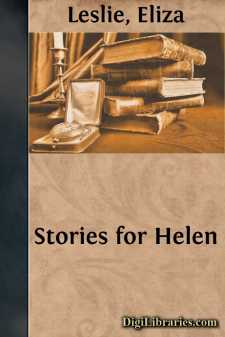Categories
- Antiques & Collectibles 13
- Architecture 36
- Art 48
- Bibles 22
- Biography & Autobiography 813
- Body, Mind & Spirit 142
- Business & Economics 28
- Children's Books 14
- Children's Fiction 11
- Computers 4
- Cooking 94
- Crafts & Hobbies 4
- Drama 346
- Education 46
- Family & Relationships 57
- Fiction 11828
- Games 19
- Gardening 17
- Health & Fitness 34
- History 1377
- House & Home 1
- Humor 147
- Juvenile Fiction 1873
- Juvenile Nonfiction 202
- Language Arts & Disciplines 88
- Law 16
- Literary Collections 686
- Literary Criticism 179
- Mathematics 13
- Medical 41
- Music 40
- Nature 179
- Non-Classifiable 1768
- Performing Arts 7
- Periodicals 1453
- Philosophy 64
- Photography 2
- Poetry 896
- Political Science 203
- Psychology 42
- Reference 154
- Religion 513
- Science 126
- Self-Help 84
- Social Science 81
- Sports & Recreation 34
- Study Aids 3
- Technology & Engineering 59
- Transportation 23
- Travel 463
- True Crime 29
Stories for Helen
by: Eliza Leslie
Description:
Excerpt
THE TELL-TALE.
"How all occasions do inform against me!"Shakspeare.
ROSAMOND EVERING was one of those indiscreet mischievous girls who are in the daily practice of repeating every thing they see and hear; particularly all the unpleasant remarks, and unfavourable opinions that happen to be unguardedly expressed in their presence. She did not content herself with relating only as much as she actually saw and heard; but (as is always the case with tell-tales) she dealt greatly in exaggeration, and her stories never failed to exceed the reality in all their worst points.
This unamiable and dangerous propensity of their daughter, gave great pain to Mr. and Mrs. Evering, who tried in vain to correct it. They represented to her that as parents cannot be constantly on their guard in presence of their own family, and that as grown persons do not always remember or observe when children are in the room, many things are inadvertently said, which, though of little consequence as long as they remain unknown, may be of great and unfortunate importance if disclosed and exaggerated. And as children are incapable of forming an accurate judgment as to what may be told with safety, or what ought to be kept secret, their wisest and most proper course is to repeat no remarks and to relate no conversations whatever; but more particularly those which they may chance to hear from persons older than themselves.
But neither reproof nor punishment seemed to make any lasting impression on Rosamond Evering; and scarce a day passed that she did not exhibit some vexatious specimen of her besetting sin. A few instances will suffice.
Mrs. Evering had a very cook, a black woman, that had lived with her more than six years, and whom she considered an invaluable servant. One morning, when Venus (for that was her name) had just left the parlour, after receiving her orders for dinner, Mr. Evering remarked, in a low voice, to his lady, "Certainly, the name of Venus was never so unsuitably bestowed as on this poor woman. I have rarely seen a negro whose face had a greater resemblance to that of a baboon." In this remark Mrs. Evering acquiesced.
Rosamond was at this time sitting in a corner, looking over her lessons. Just before she went to school, her mother thought of a change in the preparations for dinner, and not wishing to give the old cook the trouble of coming up from the kitchen a second time, she desired Rosamond to go down and tell Venus she would have the turkey boiled rather than roasted. Rosamond went down and delivered the message; but fixing her eyes on the cook's face, she thought she had never seen Venus look so ugly, and she said to her, "Venus, my father thinks you are the ugliest negro he ever saw (even for a negro) and he says your face is just like a monkey's, only worse." Having made this agreeable communication, Rosamond went out of the kitchen and departed for school, leaving Venus speechless with anger and astonishment; for though in other respects a very good woman, she was extremely vain, and had always considered herself among the handsomest of her race.
As soon as Venus found herself able to speak, she went into the parlour with her eyes flashing fire, and told Mrs. Evering that she must provide herself with another cook, as she was determined to leave her that very day. Mrs. Evering with much surprise inquired the reason, and Venus replied, that "she would not live in any house where she was called an ugly neger, the ugliest even of all negers, and likened to a brute beast."
Mrs. Evering, who had forgotten her husband's remark, asked the cook what she meant; and Venus explained by repeating all that Rosamond had told her. Mrs. Evering endeavoured to pacify her, but in vain....




